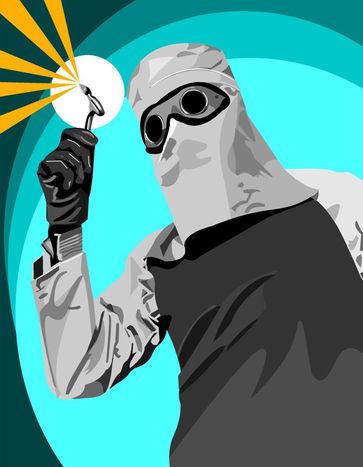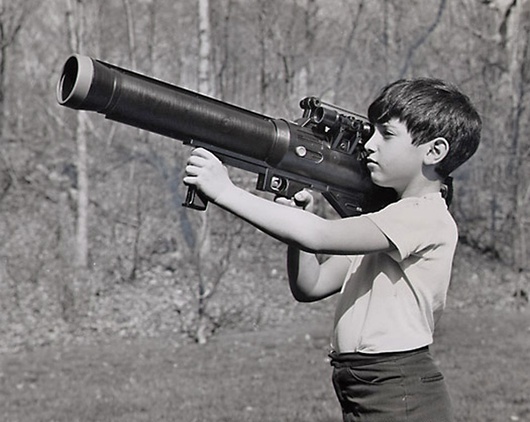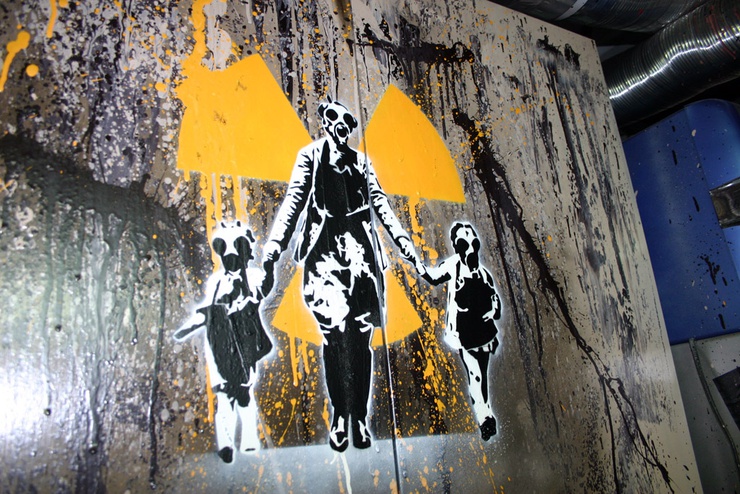
Iran, Europe, nuclear energy: one year after Fukushima
Published on
Translation by:
Alice JonesHaving rocked the whole of Europe, the Fukushima atomic disaster sparked widespread reassessments concerning the future of nuclear energy in Germany and France. Whilst a generally safer Europe finds itself divided over Iran and its acquisition of nuclear weapons, the murder of an Iranian scientist served to fuel an already explosive debate
Following the natural (earthquake and tsunami) and nuclear tragedy (leaving 19, 000 dead or injured) that hit the north-west coast of Japan on 11 March 2011, the French nuclear safety authority (the 'autorité de sûreté nucléaire') was tasked with carrying out an audit of safety in France’s power stations. 79 operational power stations and 58 reactors were investigated. The verdict: no closures were necessary but an additional 10 billion euros were to be invested with the aim of improving safety at the plants.
Political weapon
 Nuclear energy has become a political matter because France generates 75% of its electricity from nuclear power. This does not only affect France but the whole of the European union, whose negotiations with Iran have focused largely upon its potential acquisition of nuclear weapons. In Brussels the EU reached an agreement in principle on imposing an oil embargo if Tehran refused to cooperate. The US welcomed the move; Victoria Nuland, spokesperson for the US department of state, also expressed her wish that these measures be taken in consultation with the entire international community, including European allies. 'This is obviously very good news and the result of lots of consultations between the US and EU countries,' she stated, underlining the victory that this development symbolises within the context of a strategy of 'tightening the noose on Iran economically'. This decision in principle represents not only the sealing of a European agreement but also an unequivocal alliance with the US.
Nuclear energy has become a political matter because France generates 75% of its electricity from nuclear power. This does not only affect France but the whole of the European union, whose negotiations with Iran have focused largely upon its potential acquisition of nuclear weapons. In Brussels the EU reached an agreement in principle on imposing an oil embargo if Tehran refused to cooperate. The US welcomed the move; Victoria Nuland, spokesperson for the US department of state, also expressed her wish that these measures be taken in consultation with the entire international community, including European allies. 'This is obviously very good news and the result of lots of consultations between the US and EU countries,' she stated, underlining the victory that this development symbolises within the context of a strategy of 'tightening the noose on Iran economically'. This decision in principle represents not only the sealing of a European agreement but also an unequivocal alliance with the US.
In recent years Europe has been divided over the Iranian nuclear threat, but it seems that a consensus on the subject has finally been reached. Nevertheless the matter of nuclear energy and Tehran remains a delicate one. Iran recently made threats (before being forced to back down) to block the Strait of Hormuz - a transit route for about 40% of the world's oil traffic - and also against the US as a result of its naval presence in the Persian Gulf. For Iran it is a matter of asserting itself as an independent, powerful state by means of this weapon of mass destruction that remains a source of great concern and uncertainty in Europe and the US, where doubt remains over the supposed absence of Iranian military ambitions. Tensions have heightened following a recent event that sparked further controversy: an eminent Iranian nuclear scientist who worked at the country's main uranium enrichment facility was murdered on 11 January. It wasn't long before Safar-Ali Baratloo, Tehran’s deputy governor, accused Israel of his murder.
Uneasy reaction: Germany and Italy
So what is the real significance of nuclear energy and where will it lead us? 'To protect yourself from a sword you first need a shield. But forging a shield against nuclear weapons has so far proved impossible,' said Jacques Attali of 'Économie de l’Apocalypse'. Following the oil crisis of 1973 Europeans further expanded their nuclear industry, thus resulting in Europe having one of the highest concentrations of nuclear power stations in the world. The incorporation of the euratom treaty, one of the founding treaties of the European union, casts a new political light upon how we view nuclear energy. Indeed, the union with countries that are opposed to nuclear energy such as Austria has undoubtedly given rise to new considerations.
Nuclear energy has of late become a cause for concern among European populations, who have been disturbed by images coming out of Chernobyl and, more recently, Fukushima. The economic strategy (for example, for electricity), which seemed justified at the time, is now the source of a deep sense of unease. The link between energy and weapons of mass destruction has become clearer. Political decisions in 2011 were guided by this general feeling with Germany deciding to close its 17 power stations by 2022 and an Italian referendum putting a stop to plans for a nuclear relaunch. Despite involving some eye-watering investment costs the announcement does not appear to have met with such disquiet in France, the European country that currently has the most operational reactors.

'Nuclear power is the most dangerous way to boil water,' said French nuclear physician Bernard Laponche in a French television magazine, Télérama. The development of nuclear power has come up against difficulties in the past, but today has reached new heights. It is first and foremost the debate over security and safety that will no doubt lead to change within our power stations, but the stark and lasting memory of what happened at Fukushima has served to place the question of atomic energy firmly at the heart of a true public controversy. The link between our energy sources and the dangerous weapon that Iran seeks to acquire suddenly seems less distant. As French comedian Michel Colucci aka Coluche said, 'Thanks to nuclear armament, since we were born by accident so too we may die by accident.'
Images: main (cc)alvarotapia; Fukushima (cc) adobe of chaos; robot and child (cc) x-ray_delta_one/ all courtesy of flickr
Translated from L'Iran, l'Europe et le nucléaire : comment gérer l'après Fukushima ?



